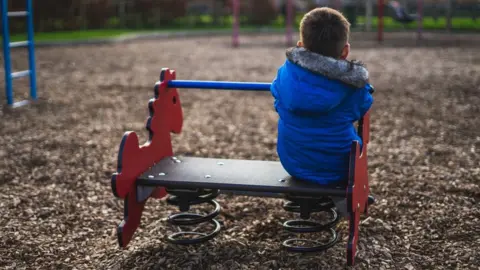Children's social care generates excessive profits - report
 Getty Images
Getty ImagesThe largest private suppliers of children's homes and foster care places in England, Wales and Scotland make excessive profits, says a watchdog.
The UK has "sleepwalked" into a system where some vulnerable children do not get good care, says a Competition and Markets Authority (CMA) report.
However, private providers say some of their services can cost less than their council equivalents.
The CMA study into children's social care was launched a year ago.
It found large private sector providers of fostering services and children's homes appeared to be making higher profits in England and Wales than would be expected in a well-functioning market.
This suggests councils are paying more than they should, particularly for fostering, the report found.
'A dysfunctional market'
The researchers found prices and profits of the largest private providers were materially higher than would be expected if the market was working well.
Data on 15 large providers from 2016 to 2020 showed steady operating profit margins averaging 22.6%, and costs rising from £2,977 to £3,830 over the period, says the report.
Overall there is a shortage of appropriate places for looked-after children, leading to some not getting the care they need, being placed far from schools and friends or separated from their siblings, says the CMA.
The authors are particularly concerned about the financial stability of some children's homes in England and Wales which are financed through private equity firms with high levels of debt.
"It is important to manage the risk of children's homes providers going bust and local authorities having to pick up the pieces," said CMA chief executive Andrea Coscelli.
The report also recommends a warning system to assess the financial health of the hardest to replace private providers, and greater efforts to bring foster care in-house.
It notes that the devolved administrations in Scotland and Wales are already moving away from the model of for-profit provision in children's social care.
The CMA says a well-functioning market should generate returns to investors of up to 6%, but the largest children's home providers make about double that.
Forensic accountant Vivek Kotecha, of the Balanced Economy Project, has done similar research and says such excess profits would be better spent by councils on more services for children.
"It could have paid for better staff wages, or it could have just funded more children who need care, or at the borderline of potentially needing care or extra help. So I think it affects children, the ones in care, but it also affects the ones who could be in care or need to be in care, but aren't receiving it."
However, in a briefing paper issued ahead of the report, the Independent Children's Homes Association says the high costs highlighted are outliers which do not reflect those in the sector generally, where profits are more modest.
The association quotes University of Kent research suggesting that private provision, particularly for children with complex needs, is often cheaper than that provided by councils.
'Growing pressure'
The BBC spoke to Hampshire County Council's assistant director of children's services Suzanne Smith, who runs the team which finds foster care or children's home places for young people who can no longer remain with their families.
The team struggles to find suitable placements, the costs keep growing and they feel there is more picking and choosing by independent providers about which child they will take.
Hampshire County Council has eight of its own children's homes, which cost more than £3,000 a week per child.
But the council says independent providers can charge anywhere between £3,500 a week to more than £10,000 for each child, depending on the complexity of their needs. Unlike in council homes, children can sometimes be asked to leave private homes with only a few hours' notice.
"Unfortunately, it drives towards profit generation as opposed to the outcomes for the child," says Ms Smith.
"What we'd really like to see is a diverse market where you've got providers who can make profit, but those profits are reasonable, and then shared accountability around the outcomes for the children."
Londoner Kim Emenike, 24, who went into foster care at seven when her mum died of cancer, says she too often felt like a pay cheque rather than a human being.
By the time she was 13, Kim says the relationship with the foster family had broken down, with little support or love, while the council did the bare minimum.
"It's like a tick box exercise," she said.

However, Kim stayed with them for another five years, fearing a shortage of foster places would mean she could be sent out of the area, away from friends and school.
She felt she was with her foster family just "because someone wants to get paid" and it was cost-effective for the council to keep her there.
Kim wants to see the care system reformed to be less profit-driven.
"I'm just someone who needed someone to care, someone to love me and someone to just be my cheerleader.
"You've got to do it because you have the heart for it - not because you get paid for it."
The Department for Education said an ongoing independent review of children's social care would address radical reform of the system.
An official said the department was also "taking forward urgent reforms to address pressures in social care", including £259m to help councils provide high quality safe homes for the most vulnerable children.
